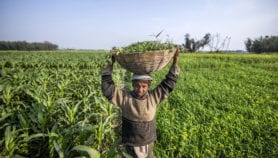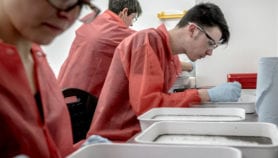By: Gilbert Nakweya
Send to a friend
The details you provide on this page will not be used to send unsolicited email, and will not be sold to a 3rd party. See privacy policy.
[NAIROBI] Building trust in agricultural biotechnology as one of the potential solutions to food security in Africa is essential, according to a study.
Published in Agriculture & Food Security this month (1 November), the study is the result of four years spent investigating how public trust in agricultural biotechnology in Africa can be developed.
One of the researchers behind the study, from the Sandra Rotman Centre, a research institute based at the University Health Network and the University of Toronto, Canada, says it requires the cultivation of honesty, transparency, accountability, capability and solidarity between scientists and the public.
"Our studies focused mainly on how trust is identified as an issue between the public-private partners (PPPs) and the public," Abdallah Daar, a researcher for the University Health Network and study co-author, tells SciDev.Net.
Daar said the widespread mistrust felt by farmers and the public towards biotech methods and products, such as genetically modified (GM) crops, and the PPPs that develop them, was a major challenge in the adoption of biotechnology and other innovations geared towards improving food security.
More than 80 agricultural stakeholders in seven Sub-Saharan African countries — Burkina Faso, Egypt, Kenya, Nigeria, South Africa, Tanzania and Uganda — were interviewed for the study.
"Our interviewees agreed that trust is a very, if not the most, important factor in the success or failure of a biotechnology public-private partnership," says lead researcher Obidimma Ezezika of the Sandra Rotman Centre.
Ezezika explains: "We found that trust in biotechnology contexts is perceived as one’s expectation that the performance and behaviour of another will be supported by tangible results; facilitated by competency and transparency; grounded in a shared vision; and guided by integrity and an interest in the common good".
This provides a checklist for assessing the general level of trust within a biotechnology PPP and can be used to tailor regulations, standards and practices that facilitate trust in these partnerships, Ezezika adds.
However, Daar observes that the researchers found trust harder to build when developing new crops for human consumption than when developing non-food products, such as medicinal drugs.
This was because the public, particularly farmers, feared that biotech food products could be harmful to them — concerns they did not often hold for non-dietary products.
Ian Noble, chief scientist from the Global Adaptation Institute (GAIN), a US-based research institute, supports the study’s decision to explore trust as a key factor in developing African agri-biotech.
He tells SciDev.Net that one of the challenges facing agri-biotech is the unease that many feel about genetically modified organisms.
More openness, honesty and transparency from all sides will enable people to make more informed decisions, he says.
"However, ultimately it will be a personal decision based on factors that go beyond the scientific demonstration of safety and risks," he adds.
GM has been an emotive subject in Africa, with supporters citing it as a possible answer to Africa’s perennial food shortages, which claim millions of lives annually.
Its critics allege that it can cause environmental contamination and raises food safety issues, while also leading to the concentration of power within a few multinationals.
Link to full paper in Agriculture & Food Security
This article has been produced by SciDev.Net’s Sub-Saharan Africa desk.
References
Agriculture & Food Security Volume 1, Supplement 1 (1 November 2012)













